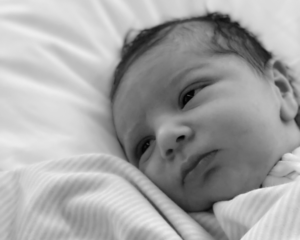As many as 200 million children globally have a rare disease, yet most aren’t diagnosed for years after birth. Instead, parents face an array of difficult symptoms often dismissed by doctors as “typical” developmental delays. In honor of FOXG1 Syndrome, Awareness Month this November, we’ll look at this disease as an example. I’m the mother to a little boy with FOXG1 Syndrome, and I, too, was once dismissed by doctors—to the point where I felt powerless and alone, with nowhere to turn to help my sick baby.

What is FOXG1 Syndrome?
For context, FOXG1 Syndrome (FS) is an ultra-rare neurodevelopmental genetic disorder that occurs due to a mutation of the FOXG1 gene. It’s usually a non-inherited mutation. The FOXG1 gene is crucial for the brain’s proper development. Mutations of the gene, therefore, result in underdeveloped brain function. Children with the most severe mutations of FS cannot walk, talk, sit up, or hold objects. My three-and-a-half-year-old son, Domenico, falls into this group. He also has a feeding tube and severe epilepsy. He’s had double eye surgery to correct his strabismus—which is when the eyes turn in or out, out of unison. Some other “foxes,” as we lovingly call our children with FS, have had surgeries for tracheotomies and spinal cord fusions. Both may be in Dom’s future—only time will tell.
Developmental delays ignored
When a child experiences developmental delays, you’d likely imagine that doctors suggest further evaluation. Instead, parents are often told to take a “wait and see” approach. This thinking may have worked well 50 or even 25 years ago, when fewer children had severe disabilities. Delays, in general, have continued to increase in occurrence since then. In fact, the American Academy of Pediatrics, the Center for Disease Control, and various international agencies have all documented these increases over the years. It is essential that developmental delays are not dismissed as “normal” and are instead properly evaluated alongside other signs and symptoms.

Early diagnosis of underlying conditions is crucial. In our case, we saw over a dozen doctors, each of whom told us he was fine, and would be fine. One pediatrician said, “Everyone is developmentally delayed these days.” We wanted to believe it, but it didn’t explain the endless crying or why he wouldn’t sleep more than two hours at a time. It didn’t explain why he had trouble eating. It didn’t explain why he couldn’t use his hands to hold objects, but instead was constantly clasping them. It didn’t explain his tongue thrusting. He seemed more than “just delayed.” Unfortunately, none of the doctors suggested further evaluation or genetic testing. And we hadn’t known to ask for it, either. Continue reading at Rare Parenting https://rareparenting.com.
Megan Nolan Sandhu, Rare Parenting https://rareparenting.com
https://www.thecrdfund.org/articles/foxg1



